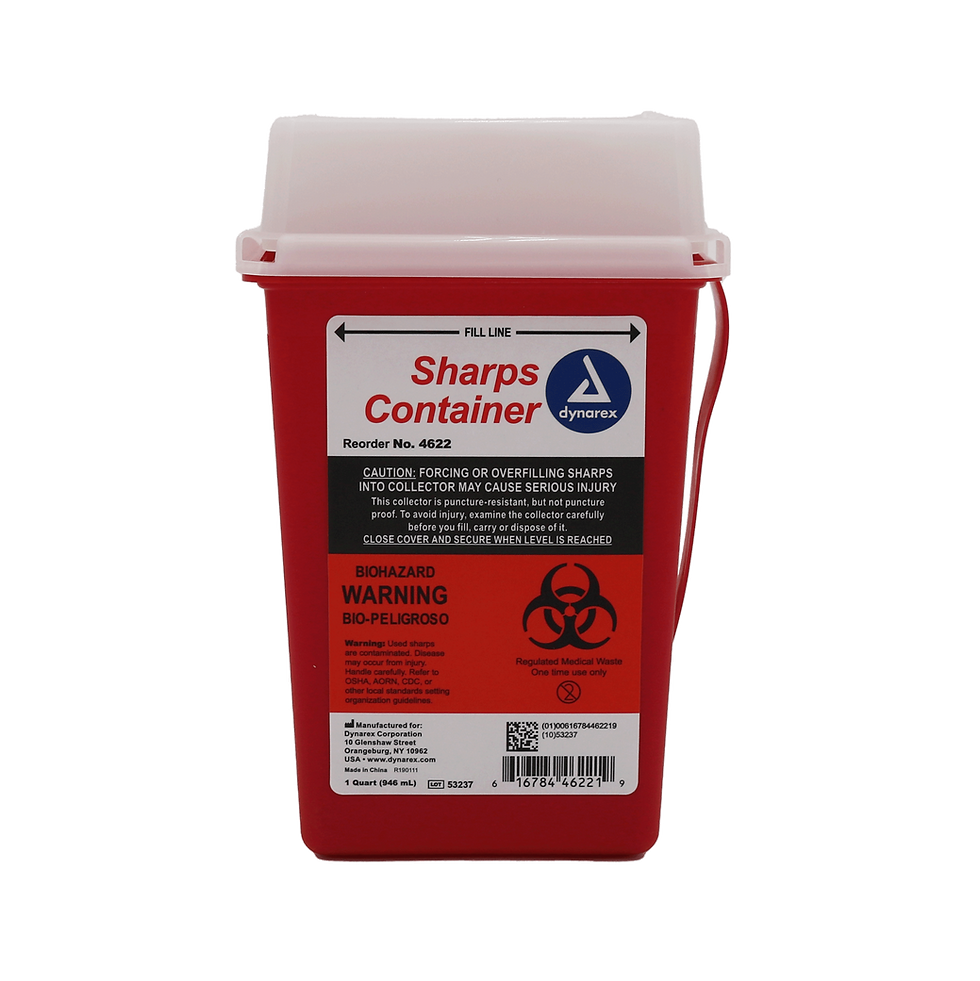Safe Sharps Disposal Practices & Home Medical Waste
- Chief 322

- Aug 14, 2025
- 4 min read
Proper disposal of home medical waste is essential for safety and environmental health. Many people use medical supplies like needles, lancets, and syringes at home. These items, known as sharps, can pose serious risks if not handled correctly. This article will guide you through safe sharps disposal methods, helping you protect yourself, your family, and your community.
Understanding Sharps Disposal and Its Importance
Sharps disposal refers to the process of safely discarding used needles, syringes, and other sharp medical instruments. These items can cause injuries and spread infections if they are not disposed of properly. For example, a used needle can accidentally prick someone, potentially transmitting diseases like hepatitis or HIV.
Why is sharps disposal important?
Prevents accidental needle sticks
Reduces the risk of infection transmission
Protects sanitation workers and the environment
Complies with local regulations and laws
Using a designated sharps container is the safest way to store used sharps until they can be disposed of properly. These containers are puncture-resistant and designed to prevent leaks and spills.

Practical Tips for Safe Sharps Disposal at Home
Handling sharps at home requires care and attention. Here are some practical steps to follow:
Use an approved sharps container
Always place used needles and other sharps in a proper sharps container. Do not throw them in regular trash or recycling bins.
Do not overfill the container
Fill the container only up to the fill line or about three-quarters full. Overfilling increases the risk of injury.
Keep the container out of reach of children and pets
Store the container in a secure place to prevent accidental access.
Seal the container when full
Once the container is full, close the lid tightly to prevent spills.
Follow local disposal guidelines
Different areas have different rules for disposing of sharps containers. Check with your local health department or waste management service.
Never recap needles
Avoid recapping needles after use to reduce the risk of accidental needle sticks.
Label the container if required
Some jurisdictions require labeling the container as "biohazard" or "medical waste."
By following these steps, you can ensure that your home medical waste is handled safely and responsibly.

How do I dispose of a Sharps container near me?
Finding a nearby location to dispose of your sharps container is crucial for safe disposal. Many communities offer specific drop-off points or collection programs for sharps waste.
Here are some common options:
Pharmacies and drugstores: Many pharmacies accept sharps containers for disposal. Call ahead to confirm.
Local health departments: Some health departments provide collection sites or mail-back programs.
Household hazardous waste facilities: These centers often accept sharps containers.
Medical clinics or hospitals: Some facilities allow patients to return sharps containers.
Community collection events: Occasionally, local governments organize special collection days.
Before disposing of your sharps container, ensure it is sealed and labeled if required. You can also visit this link for sharps container disposal to find more information and resources.

Environmental and Health Benefits of Proper Sharps Disposal
Proper sharps disposal protects both public health and the environment. When sharps are discarded improperly, they can:
Injure sanitation workers and the public
Contaminate soil and water sources
Spread infectious diseases
By using approved sharps containers and following disposal guidelines, you help reduce these risks. Additionally, many disposal programs ensure that sharps waste is treated and destroyed safely, often through incineration or other sterilization methods.
Additional benefits include:
Reducing landfill contamination
Supporting recycling and waste management efforts
Promoting community health and safety awareness
Proper sharps disposal is a simple but powerful way to contribute to a healthier environment and safer communities.
Tips for Managing Other Types of Home Medical Waste
Besides sharps, other types of home medical waste require careful handling. These include:
Expired or unused medications: Do not flush or throw them in the trash. Use drug take-back programs or follow FDA guidelines.
Bandages and dressings: Dispose of in sealed plastic bags to prevent contamination.
Gloves and masks: Dispose of in regular trash unless contaminated with blood or bodily fluids.
Medical tubing and catheters: Follow local disposal rules; some may require special handling.
Always separate sharps from other medical waste and use appropriate containers. Labeling and sealing waste properly helps prevent accidental exposure.
Encouraging Safe Sharps Disposal in Your Community
Promoting safe sharps disposal benefits everyone. Here are ways to encourage responsible practices:
Share information about local disposal sites and programs.
Provide sharps containers to family members or neighbors who need them.
Advocate for community collection events and accessible disposal options.
Educate children and adults about the dangers of improper sharps disposal.
Support policies that improve medical waste management.
By raising awareness and providing resources, you can help create a safer environment for all.
Safe disposal of home medical waste, especially sharps, is vital for health and safety. Using approved containers, following local guidelines, and finding proper disposal sites are key steps. Remember, you can learn more about sharps container disposal to ensure you are handling your sharps waste responsibly. Taking these precautions protects you, your loved ones, and your community from harm.





Comments